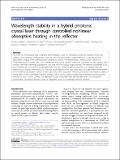Wavelength stability in a hybrid photonic crystal laser through controlled nonlinear absorptive heating in the reflector
Abstract
The need for miniaturized, fully integrated semiconductor lasers has stimulated significant research efforts into realizing unconventional configurations that can meet the performance requirements of a large spectrum of applications, ranging from communication systems to sensing. We demonstrate a hybrid, silicon photonics-compatible photonic crystal (PhC) laser architecture that can be used to implement cost-effective, high-capacity light sources, with high side-mode suppression ratio and milliwatt output output powers. The emitted wavelength is set and controlled by a silicon PhC cavity-based reflective filter with the gain provided by a III–V-based reflective semiconductor optical amplifier (RSOA). The high power density in the laser cavity results in a significant enhancement of the nonlinear absorption in silicon in the high Q-factor PhC resonator. The heat generated in this manner creates a tuning effect in the wavelength-selective element, which can be used to offset external temperature fluctuations without the use of active cooling. Our approach is fully compatible with existing fabrication and integration technologies, providing a practical route to integrated lasing in wavelength-sensitive schemes.
Citation
Bakoz , A P , Liles , A A , Gonzalez-Fernandez , A A , Habruseva , T , Hu , C , Viktorov , E A , Hegarty , S P & O’Faolain , L 2018 , ' Wavelength stability in a hybrid photonic crystal laser through controlled nonlinear absorptive heating in the reflector ' , Light: Science & Applications , vol. 7 , 39 . https://doi.org/10.1038/s41377-018-0043-8
Publication
Light: Science & Applications
Status
Peer reviewed
ISSN
2047-7538Type
Journal article
Description
This work was supported by the Science Foundation Ireland under Grants SFI12/RC/2276 and 16/ERCS/3838, Engineering and Physical Sciences Research Council (EPSRC) (doctoral grant EP/L505079/1 and equipment grant EP/L017008/1); European Research Council (ERC) (Starting Grant 337508); and Scottish Enterprise.Collections
Items in the St Andrews Research Repository are protected by copyright, with all rights reserved, unless otherwise indicated.

